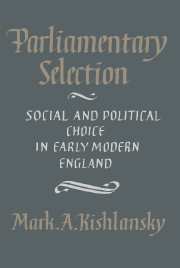1 - Parliamentary Selection
from PART I - SELECTIONS AND SOCIAL CHOICE
Published online by Cambridge University Press: 22 September 2009
Summary
The martial feats of Caius Marcius earned him the appellation Coriolanus. When he returned to Rome after his greatest triumph his mother, Volumnia, exulted: “I have lived to see inherited my very wishes.… Only there's one thing wanting, which I doubt not but our Rome will cast upon thee.” This crowning accolade was selection as consul, a veneration of honor and merit reserved for the noblest Romans. The process, in Shakespeare's Rome, was one of nomination by the senate and approbation by the citizenry. The body of senators would meet to select a candidate to be presented to the people. Marcius's heroism against the Volscians concluded a career of gallantry that even the aged Cominius felt himself unable to describe. He was nobly born and bred, and his valor – “the chiefest virtue” – could not “in the world be singly counterpoised.” He was adopted by the senate unanimously in the belief that “he cannot but with measure fit the honors which we devise him.”
It remained only for Coriolanus to present himself for the people's assent. This aspect of the selection process involved the symbolic humbling of the recipient of high honors. The nominee, in the “gown of humiliation,” perambulated the public squares requesting the voices of the citizens. It was the act of petition that was paramount – “the price is to ask it kindly.” In turn, the people demanded some show of the nominee's merit.
- Type
- Chapter
- Information
- Parliamentary SelectionSocial and Political Choice in Early Modern England, pp. 3 - 21Publisher: Cambridge University PressPrint publication year: 1986
- 2
- Cited by



